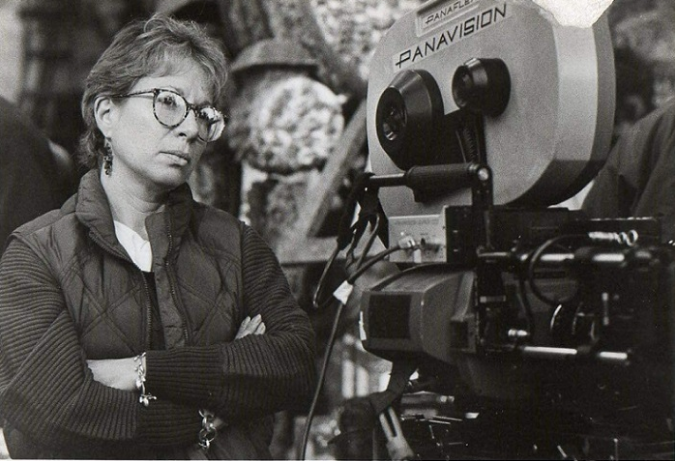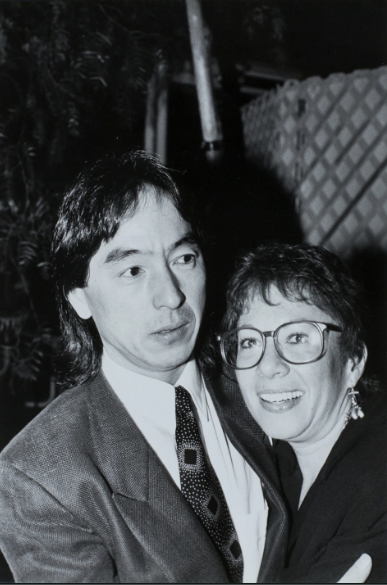(Fran Rubel Kuzui, USA/Japan, 1988, 99 minutes)
When Fran Rubel Kuzui made Tokyo Pop, she was truly writing what she knew as an American who divides her time between the US and her husband Kaz Kuzui's native Japan (Lynn Grossman served as cowriter).
In Kuzui's directorial debut, 25-year-old Carrie Hamilton, whose hair length changes from scene to scene, plays Wendy, an aspiring New Jersey songwriter who struggles to find singing gigs. When a friend sends her a "wish you were here" postcard featuring an image of Mt. Fiji, she spontaneously decides to move to Japan. After all, some American musicians have had better luck in Asia--maybe she'll be one of them.
She soon finds herself in neon-lit Tokyo. She doesn't speak the language, her friend moved to Thailand without telling her, and she has nowhere to stay, but when she spots a fellow American, they direct her to a Mickey Mouse-inspired hostel for gaijin or non-Japanese (interestingly, the American is trans). Next she just needs a job that doesn't require a work visa.
One of the tenants suggests a hostess job, and so that's how she ends up working in a karaoke bar.
Hamilton's costar, Yutaka "Diamond Yukai" Tadokoro of the Red Warriors, makes his first appearance during the Keith Haring-designed opening credits with a turbo-charged take on Carl Perkins' "Blue Suede Shoes." Tadokoro plays Hiro, a rock singer considering adding some kind of gimmick--like a gaijin---to lend his band a competitive advantage.
Wendy and Hiro run into each other late one night at a noodle stand. His band mates bet him that he can't pick her up, but she's missed the last train home and can't afford a hotel, so he offers to help, but language and cultural barriers lead her to believe he might be a creep--or that he thinks she's a working girl--but he does solve her immediate problem.
The following (very platonic) morning, they go their separate ways. The next time Wendy runs into Hiro, she tries to blow him off, but he's persistent in a goofy kind of way, and she agrees to have a drink with him. If Wendy looks like a punker with her bleach-blonde hair and fishnet stockings, Hiro looks like a rocker with his teased hair and black leather, though as the title indicates: the music they end up making isn't really either. It's...Tokyo pop.
For their first date, Wendy and Hiro take in a noise band with a gender-bending singer. If the couple is clearly coded as straight and cisgender, I appreciate Kuzui's nonchalant handling of the gender-fluid individuals in their midst.
By the end of the night, Wendy no longer has misgivings about Hiro, especially after she initiates him into the art of unhurried lovemaking, a new concept to a guy who sees getting undressed for sex as a waste of time. Though he enjoys showing her around Tokyo and teaching her Japanese, Hiro prefers American culture. Wendy, unsuccessfully, encourages him to sing in Japanese, rather than covering English-language hits exclusively.
This creates tension, because she wants to write her own ticket, while Hiro's band wants to install her as their front person, and he feels caught in the middle, because he likes Wendy, but doesn't want to give up his spot.
Wendy is also forthright in a way that doesn't just mark her as an American, but as a feminist, and most of the male musicians she meets are flummoxed--if not put off--by her brash persona. She's tall, blonde, non-subservient; a dream to some Japanese men...and a nightmare to others.
When she finally joins Hiro's band, it's more as a co-lead than front person--though the press focuses on her more--and they still have to figure out how to get star-making manager Dota (You Only Live Twice's Tetsurô Tanba) to listen to their demo, leading to some rather amusing stunts that eventually pay off, though not as intended. (Fun fact: the band X, which Stephen Kijak profiled in the 2016 documentary We Are X, makes a brief appearance as Dota associates--I recognized them immediately by their sky-high hair.) If Wendy's dream of pop stardom comes true, she finds that becoming "Big in Japan" comes with hidden costs for which she wasn't prepared.
In the end, both she and Hiro have to find ways to be true to themselves, and it won't come from fronting a Japanese-American band that specializes in Carole King and Lovin' Spoonful covers. Though Kuzui grapples with cross-cultural relationships and, to a lesser extent, cultural appropriation, Tokyo Pop mostly revolves around authenticity, however the performer in question defines it. It's an ending that predicts, or at least predates, the conclusion to Allison Anders' 1996 King-inspired film, Grace of My Heart.
Hamilton, who spent two seasons on the NBC version of Fame--I used to watch it faithfully--isn't a bad singer, though she isn't quite as good as the more experienced Tadokoro, but then, as a punk-adjacent singer, she doesn't need to be too good, much like the just-good-enough Diane Lane in the Nancy Dowd-penned Ladies and Gentlemen, the Fabulous Stains.
But it's Tadokoro who pulls off an acapella "Natural Woman"--he titled his memoir Natural Man--while also proving he's an adept guitarist. If he isn't Hamilton's equal as an actor, it may be due in part to the amount of English dialogue he has to deliver (his band mates speak entirely in Japanese).
Then there's Hamilton's parentage. As the oldest child of prime time superstar Carol Burnett, it may have seemed like a stretch for her to convincingly play a woman living on the edge, but Hamilton was a famously wild child. As with Drew Barrymore, though 11 years apart in age, she got drug addiction out of her system early on, and was reportedly clean and sober by the time she made this film. It's possible that this experience fed into her performance, because she's convincing in most every way.
In a recent New York Times piece on the film, director Kuzui only remembers Hamilton understandably balking at the way the bleach they used caused her hair to fall out. I suspect this may be why the length varies from scene to scene--and why Wendy wears so many headbands and headscarves--and not strictly due to budgetary or continuity issues.
Despite good notices from critics, Kuzui's distributor, International Spectrafilm, went belly up, and that was pretty much the end of that, even with a coveted berth at the Cannes Film Festival. It parallels the trajectory of a few other 1980s films about punk-inspired female musicians--like Allan Moyle's similarly underseen, undervalued Times Square--that are finally getting their due by way of new restorations and home-video releases.
Only one year later, another American director made a film about a Japanese fan of American music--Carl Perkins above all--and found himself with a modest hit on his hands. The film: Mystery Train. Kuzui, unfortunately, didn't have Jim Jarmusch's name recognition. And despite her long career in show business, she still doesn't.
After Tokyo Pop, Carrie Hamilton continued to act, but she never top-lined another film. One of her last, most noteworthy roles arrived with The X-Files season six episode "Monday," in which her character, Pam, has to live the same disastrous day over and over again, unless Mulder and Scully can find a way to break the cycle. She's very good in a desperate, feverish part miles away from the optimistic young musician she plays here.
Hamilton died in 2003 of pneumonia caused by lung and brain cancer at 38.
Ever since, her mother, with whom she worked frequently, has done everything possible to keep her name alive, including her participation in the 4K restoration of this film with Dolly Parton and Jane Fonda via IndieCollect's Fund for Women Directors. Not an obvious choice when it comes to shoestring-budget productions, it's possible Kuzui recruited Dolly through her alliance with the country star, Fonda's friendship (dating back to 9 to 5), or because Dolly's production company with Sandy Gallin, Sandollar, produced both Buffy and Angel--all three things might also be true.
More happily, Kuzui didn't give up, even though she couldn't get her next project off the ground, and ended up having to abandon it.
Then she came across Joss Whedon's script for Buffy the Vampire Slayer, and knew she had to adapt it, this time with major studio backing and name-brand stars. She and her husband, who produced the 1992 horror comedy, would thereafter land production credits on both Buffy and Angel. Though Kuzui never directed another feature film, she and Kaz have worked primarily as distributors of Japanese films for the American market ever since.
Tadokoro has also remained active as an actor, musician, and variety show staple. Most cinephiles are likely to recognize him as the Suntory commercial director in Sofia Coppola's Lost in Translation, a film inspired by her travels in Japan, and one that may have also taken inspiration--at least spiritually--from Fran Rubel Kuzui's American-in-Japan predecessor.
It's truly gratifying to see Kuzui and Hamilton finally getting their due.
6/19/25 update: now on Third Window Films with a bevy of extras.
This month, 35 years after the fact, marks the premiere of Tokyo Pop in the US. It plays exclusively in Seattle at The Beacon Cinema on Saturday, August 26, and Wednesday, August 30. Kino Lorber will be releasing it on Blu-ray with a Fran Rubel Kuzui commentary track on December 5. Images from Kino Lorber, Filmink (Fran at work), and Buffy Fandom (Fran and Kaz).







No comments:
Post a Comment